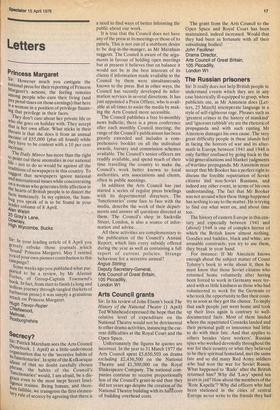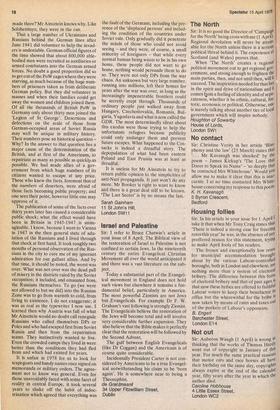The Russian prisoners
Sir: It really does not help British people to understand events which they are in any case historically ill-equipped to grasp, when publicists use, as Mr Ainsztein does (Letters, 25 March) intemperate language in a style of self-righteous rage. Phrases such as 'greatest crimes in the history of mankind' and 'ignorant rubbish' etc are the rhetoric of propaganda and with such ranting Mr Ainsztein damages his own cause. The very great difficulty people in these islands feel in facing the horrors of war and its after math in Europe between 1941 and 1948 is only further confused by going back to the wild generalisations and blanket judgments of wartime propaganda. Mr Ainsztein must accept that Mr Booker has a perfect right to discuss the forcible repatriation of Soviet citizens and non-Soviet Russians, and indeed any other event, in terms of his own understanding. The fact that Mr Booker was not around when these things happened has nothing to say to the matter. He is trying to find out what went on, and about time too.
The history of eastern Europe in this century and especially between 1941 and (about) 1948 is one of complex horror of which the British know almost nothing. Goodies and baddies, black and white, are unusable constructs; you try to use them, they break in your hand.
For instance: If Mr Ainsztein knows enough about the subject matter of Count Tolstoy's book to write about it, then he must know that those Soviet citizens who returned home voluntarily after having been forced to work in Germany were treated with as little kindness as those who had volunteered to work for the Germans or who took the opportunity to flee their country as soon as they got the chance. To imply that such people just went home and took up their lives again is contrary to welldocumented facts. Most of them landed where the repatriated Cossacks landed and their personal guilt or innocence had little to do with their fate. And that applies to others besides 'slave workers'. Russian spies who worked devotedly throughout the war for their country or what they believed to be their spiritual homeland, met the same fate and so did many Red Army soldiers who had won the war for Soviet Russia. What happened to `Rado' after the British returned him? Why did 'Lucy' spend ten years in jail? How about the members of the 'Rote Kapelle'? Why did officers who had been stationed in the cities of central Europe never write to the friends they had made there? Mr Ainsztein knows why. Like Solzhenitsyn, they were in the can.
That a large number of Ukrainians and Russians behind the German lines after June 1941 did volunteer to help the invaders is undeniable. German official figures of the time showed that about 800,000 ablebodied men were recruited as auxiliaries or armed combatants into the German armed forces. No doubt a good proportion did so to get out of the PoW cages where they were starving, as much because of the huge numbers of prisoners taken as from deliberate German policy. But they did volunteer in masses and when their families could get away the women and children joined them. Of all the thousands of British PoW in Germany only about thirty men joined the 'Legion of St George'. Desertions and defections on the scale of those from German-occupied areas of Soviet Russia may well be unique in military history. Their numbers pose an historical question — Why? In the answer to that question lies a major cause of the determination of the British, and at first of the Americans, to repatriate as many as possible as quickly as possible. We had made allies of a government from which huge numbers of its citizens wanted to escape at any price. Those who knew the facts, foremost that of the numbers of deserters, were afraid of those facts becoming public property; and one sees their point, however little one may approve of it.
The publication of some of the facts over thirty years later has caused a considerable public shock; what the effect would have been in Britain in 1945-1947 is unimaginable. I know, because I went to Vienna in 1947 in the then general state of adulation of the Russians and I lived through that shock at first hand. It took roughly two months of personal observation of the Russians in the city to cure me of my ignorant admiration for our gallant allies. And by that time, it should be noted, the worst was over. What was not over was the dead pall of misery in the districts ruled by the Soviet occupation; it included, and emanated from, the Russians themselves. To go (we were not allowed to but we did) into the Russian Zone was to go from warmth to cold, from living to existence. I do not exaggerate; it was as real as the typewriter I now use. I learned then why Austria was full of what Mr Ainsztein would no doubt call renegade Russians who called themselves DPs or Poles and who had escaped first from Soviet Russia and then from the repatriation teams. They instinctively wanted to live. Even the crowded camps they lived in were better than the conditions they had fled from and which had existed for years.
It is unfair in 1978 for us to look for scapegoats and bandy names once signed on memoranda or military orders. The agree ment not to know was general. Even for those unavoidably faced with some facet of reality in central Europe, it took several years to shake off the habit of indoctrination which agreed that everything was
the fault of the Germans, including the presence of the 'displaced persons' and including the condition of the countries under Soviet rule. Only gradually did it penetrate the minds of those who could not avoid seeing — and they were, of course, a small minority of foreigners — that while every normal human being wants to be in his own home, these people did not want to go home, nothing would persuade them to do so. They were not only DPs from the war chaos. An unknown but very large number, running into millions, left their homes for years after the war was over, as long as the increasingly impenetrable frontiers could be secretly crept through. Thousands of ordinary people just walked away from Hungary, Czechoslovakia, Romania, Bulgaria, Yugoslavia and what is now called the GDR. The most determinedly silent about this exodus were those trying to help the unfortunate refugees because publicity could only endanger them and prevent future escapes. What happened to the Cossacks is indeed a dreadful story. The depopulation of what had been eastern Poland and East Prussia was at least" as dreadful.
It is useless for Mr Ainsztein to try to return public opinion to the simplicities of anti-Nazi propaganda. It just won't do any more. Mr Booker is right to want to know and there is a great deal still to be known. 'The Last Secret' is by no means the last.
Sarah Gainham 11 St John's Hill, London SW11



































 Previous page
Previous page